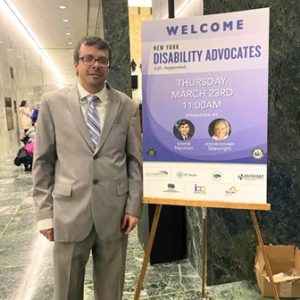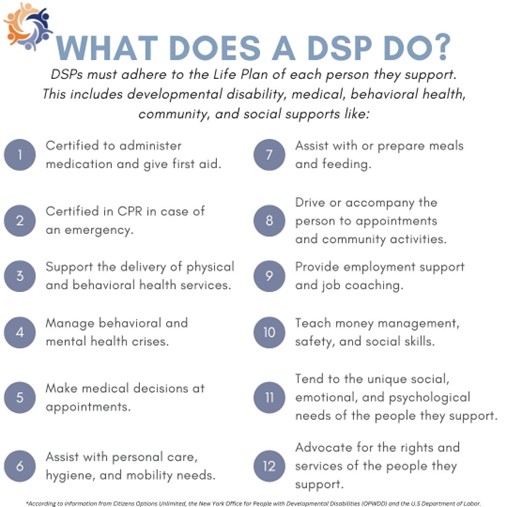Matt Hofele’s Journey to Albany
Self-Advocates Making a Statement
Wearing a grey suit and dark-rimmed glasses, Matt Hofele practiced his speech in a Holiday Inn hotel room in downtown Albany.
The 36-year-old, who lives in a Citizens Options Unlimited group home in Greenlawn, was preparing to speak to the nearly 300 people rallying inside the state capitol building.
On March 23, Matt joined charities, provider agencies, and direct support professionals (DSPs) in rallying for more funding for intellectual and developmental disabilities (I/DD) services to be included in the New York State 2023–2024 Fiscal Year Executive Budget.
The state is waiting for Governor Kathy Hochul to sign the budget into effect, having missed the April 1st deadline for the second year in a row.
Underfunding leaves agencies grappling to provide services.
“Speaking up for my needs and the needs of others is an important part of who I am,” Matt said at the rally, organized by the New York Disability Advocates (NYDA). “My challenges are not unique. What I mean by that is that many other people supported across the state need their staff too.”
Leaders in the I/DD community are saying an 8.5% cost-of-living adjustment (COLA) is needed in the budget to combat a combination of the current state of inflation in this country and a decade of underfunding disability services.
Agencies across the state are also calling for a Direct Service Wage Enhancement to be included to combat the severe staffing crisis in the field, especially impacting DSPs. Nonprofit disability service agencies across New York have one in five DSP positions vacant. Retention in this field is also extremely low with employee turnover rates of 36.3%, meaning nearly one out of every three staff hired will end up leaving the field, according to the OPWDD.
“I hope this rally will make policymakers value our humanity and care for us as much as our staff do,” Matt said.
The DSP staff shortage directly impacts people with I/DD receiving services by harming an agency’s ability to sustain services and programs, like providing transportation to those they support.
“I need the support of my staff to accompany me to various activities,” Matt continued in his speech. “My medical challenges impact my daily life; without my staff I would be living a more restricted life.”
Matt made the trek upstate with Danielle Boben, a DSP. They traveled there by public bus, and each had their own hotel room for the evening. In the week prior, residential staff at Citizens’ Greenlawn residence assisted Matt with writing and practicing his speech.
“DSPs are the backbone of our agency,” shared Colleen Tapia, Compass Quality Improvement Administrator for Citizens Options Unlimited. Colleen has worked in the field for 33 years and started her career as a DSP.
DSPs are skilled essential workers that work directly with people with I/DD. They assist people in becoming more independent and integrated into their community. DSPs must adhere to the Life Plan of each person they support. Life Plans are created with an individual’s team, which includes Care Managers, their family or guardians, health care professionals, and DSPs.
“Sometimes they are doing tasks that are similar to a nurse, secretary, and teacher combined,” Matt said. “They do one of the most important jobs in this world – they take care of people’s lives.”
 Matt requires a staff member to accompany him when he goes out into the community, primarily for transportation and assistance with maintaining his medical condition, which includes seizures and diabetes. This includes checking his insulin levels but also maintaining a healthy diet.
Matt requires a staff member to accompany him when he goes out into the community, primarily for transportation and assistance with maintaining his medical condition, which includes seizures and diabetes. This includes checking his insulin levels but also maintaining a healthy diet.
His DSPs are AMAP certified, which means they are authorized to administer medications and assist Matt with handling his medical appointments with doctors and hospitals. Because of Matt’s medical condition, he frequently visits the hospital, which can cause him to miss the planned activities on his schedule.
“I like to keep busy, just like many other people in the world,” Matt said. “It’s important to me that I get to see my family and go to concerts, charities, and work. I advocate for myself as much as I can.”
Living the Life You Choose is Self-Advocation
Three days a week, Matt works at disability agency AHRC Nassau’s Human Resources Department in Plainview. As someone who receives disability services, he provides first-hand insight during new hire orientations and training.
Two days a week, through his self-direction budget, he plans for staff to take him into the community as directed in his Life Plan.
Self-Direction gives a person a voice in deciding what services and supports are important to them and allocating their budget to support those choices. This provides a level of self-determination, which can lead to:
- Meaningful relationships with family and friends.
- Positive effects on mental health, including increased self-esteem and decreased feelings of helplessness or hopelessness.
- Living in the home and community they choose.
- Working, volunteering or joining in activities they enjoy.
Enhancing community integration and social capital is at the core of self-direction.
Every few weeks, he teaches a crocheting class at a weekend respite program for people with I/DD. Once a month, Matt volunteers at a local food pantry. He also enjoys attending concerts, comedy clubs, and plays; in a few weeks he will be seeing Billy Joel at Madison Square Garden.
Becoming a self-advocate is what catapulted Matt into getting involved in advocacy for the overall disability community. He credits his mentor, Colleen, with helping him discover this passion. Colleen first met Matt while she was creating a person-centered Life Plan for his former girlfriend, as he was a part of her support system. At the time, Matt was still living at home with his parents.
“He had desires to set some goals for his life,” Colleen said.
With the help of Colleen, Matt eventually moved into Citizens Options Unlimited’s Helen Kaplan Intermediate Care Facilities (ICF). People living in an ICF typically require long-term care and have a higher level of need related to medical or behavioral complexities.
As he grew more independent, he was able to move to a less restrictive environment, known as an Individual Residential Alternatives (IRA), in Greenlawn. IRAs typically have six residents and provide individualized supports based on a person-centered planning process. People are supported to be independent according to their level of ability.
Soon after, Matt got involved with the agency’s council meetings where people supported by the agency learn about their rights and how to navigate the internal organization as well as the state’s disability system.
“That’s where Matt comes in,” Colleen said. “As a person supported, he has a pulse on what’s really going on in the agency.”
The council works closely with Citizen’s Compass Department to ensure a person-centered focus with valued outcomes, as well as health and safety compliances across all programs and services.
Citizens Options Unlimited is 1 of only 4 agencies in the state with a Compass designation. The Compass designation is given to provider agencies which have “demonstrated the ability to consistently provide quality supports and services that exceed minimal regulatory requirements,” according to the OPWDD. This means the agency internally audits itself, rather than requiring the OPWDD to do so.
“At that time, we were beginning to hire a lot of people who were strong advocates, Matt being one of them,” Colleen said. “He showed real leadership and a desire to help the next person, all the while navigating these things on his own.”
From Then ‘til Now
Matt’s personal self-advocacy journey, however, started much earlier.
“Since the 2000s, the quality difference in disability care is like night and day,” Matt noticed. “Staff are more aware of our needs and respectful of the people.”
Matt’s earliest experience with disability care was in 1998 after he was hit by a car while riding his bicycle, resulting in a traumatic brain injury. After Matt got out of a four-month medically induced coma, he began his journey to recovery.
“I had to re-learn how to talk and walk, as well as cognitive and basic life skills,” Matt said.
The care he initially received at a head trauma unit in Massachusetts was abusive, isolating, and negligent, Matt said. This is what ignited his passion for self-advocacy and changing the system.
“My political interests have grown over the years. It’s how I can make things happen,” Matt said. “I not only noticed it makes things happen with law and policy, but it goes on to form the state budget and how it’s given to disability services.”
Matt is a current member of the Interagency Council of Developmental Disabilities Agencies Inc. (IAC), a nonprofit member-based organization that provides service providers of the I/DD community with the latest guidelines and compliance training. Matt is also a former Self-Advocacy Association of New York State, Inc. (SANYS) board member. The position is elected every three years and Matt said he looks forward to running for re-election in the future.
Over the years, Matt has advocated against many societal and governmental issues that impact the disability community, such as discrimination, more privacy and independence in choosing the life you live, and most recently for more disability funding to be included in the New York State 2023–2024 Executive Budget.
“He has a good network and a group of peers,” said Colleen. “Some are interested in advocating and some people are just not. Matthew certainly is the one for this. He has a strong voice and wants to be that person who can mentor his peers and collectively organize self-advocates.”
